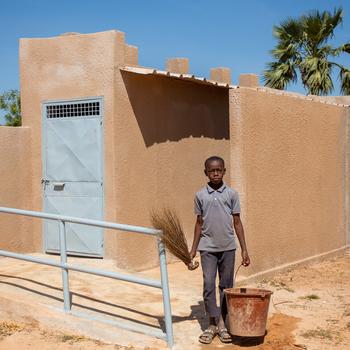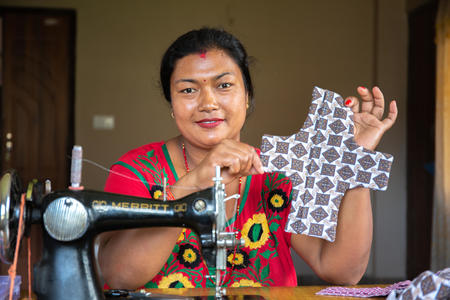Globally, more than 500 million people – that's a quarter of everyone who menstruates – don't have the resources they need to manage their period.
Dirty, broken toilets that don’t lock properly. No running water, or places to wash in privacy. Dangerous misinformation, and stigmas that keep menstruation shrouded in shame and secrecy.
All these things aren’t just humiliating, but they’re unsafe too – and can have far-reaching impacts that put women and girls at a disadvantage throughout their lives. Many simply have no choice but to stay home every month, missing out on vital opportunities to go to school, earn a living, and take control of their futures.
Tackling taboos
We encourage young people to talk about periods openly – like in this community awareness-raising session in New Delhi, India, where adolescent girls learn about menstruation and good hygiene, free from stigma or judgement.
Honest conversations help children to grow up knowing how to manage their periods properly, as well as understanding they aren’t something to be ashamed of.
And we make sure boys – like 11-year-old Zie, an active member of his school hygiene club in Banfora, Burkina Faso – are included too, to challenge the stigma and harmful beliefs around periods.
Keeping girls in the classroom
A combination of shame, limited access to products, and a lack of decent toilets can force girls to miss school when they have their period – falling further and further behind in the classroom, and sometimes dropping out entirely.
Meet Rihanata, Sandhya and Twiringiyimana – three girls who aren't letting periods hold them back in school:
Developing skills – and self-confidence
Over a two-day training course run by our local partner in Kavre, Nepal, Sangita learned how to make reusable cotton sanitary pads, as well as how to stay healthy whilst on her period.
The homemade pads are more hygienic than using old pieces of cloth, and cheaper than buying disposable ones. And, especially important in a district struggling to manage its solid waste effectively, they don’t risk polluting local water sources.
For Sangita, though, the benefits don’t end there.
A few months after the initial session, she was invited to share her knowledge with another group, giving her the opportunity to connect with more local women. And, after making a name for herself, she completed a large commercial order – something she plans to pursue as a part-time job once her children are in school.
Supporting young people with disabilities
People with disabilities, like Meena, often face extra challenges and discrimination when they're menstruating. Our project in Nepal helped young people with learning disabilities develop their self-confidence and understanding of how to manage their periods safely.

Main image: women and girls take part in a menstrual hygiene management training session in Lucknow, India.





